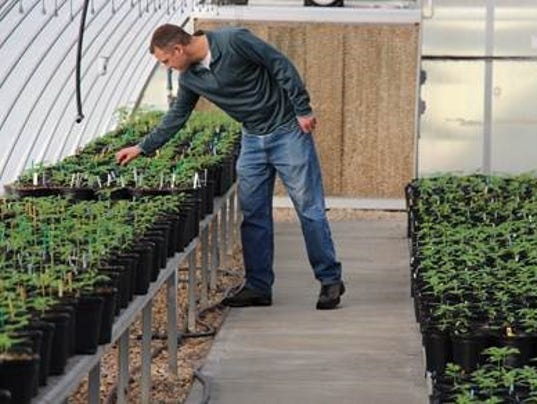Source: coloradoan.com
Cannabis is more than the often-smoked flower. A new Colorado law created a study group to examine its use as animal feed.

A Colorado task force is studying the potential use of hemp in animal feed.
Cannabis: It’s not just for medicinal or recreational purposes. At least that's what one commercial grower hopes.
New West Genetics is hoping non-THC-containing varieties could be used in animal feed. A new state law carried by Fort Collins’ Rep. Jeni Arndt is a step closer to making that a reality.
The law, which passed in the 2017 legislative session, creates a task force to study the application of industrial hemp in animal feed.
Arndt, a Democrat, said she got involved because she saw the emerging markets and wanted to help move hemp past “funky shirts and hats.” She said she hoped the task would lead to the market opening up for producers.
It’s also one more avenue where Colorado is working to tap the full benefits of cannabis. It follows an effort by Colorado State University to better understand how non-psychoactive cannabinoids may be able to help dogs with ailments such as seizures and arthritis.
New West Genetics pushed for the progress on industrial hemp — specifically as animal feed — after it received interest from feed providers.
But regulations and a lack of science behind the request put a pause on pursuing it, CEO Wendy Mosher said.
Hemp is nutrient-rich and doesn't take a lot of water to grow, Mosher said. Add in its relative newness to the market and it's easy to see why it's garnering interest in Colorado and beyond.
But the science hasn't caught up, she said. She's hoping more peer-reviewed and validated studies emerge on the issue.
Hollis Glenn, director of the inspection and consumer services division of the Colorado Department of Agriculture, said the task force will take a holistic look at industrial hemp in animal feed, from the impact on animals to the economics of it and the legal framework in which it would operate.
"We're not advocating one position or another, except that Colorado ranchers and farmers are protected while affording them the opportunity to explore new markets," Glenn said.
He praised industrial hemp producers in the state for their professionalism as the market emerges. They want to hemp to be treated like carrots or corn, he said, but accept that getting to that point means a deeper look at their crop.
Colorado also can be a leader in industrial hemp, particularly as markets for it emerge regardless of regulatory framework, Glenn said. Other states will likely be involved in the task force and an invite was extended to the Food and Drug Administration.
He stressed the group will not generate scientific data. Some of the questions Glenn plans for the group to answer include how the U.S. Department of Agriculture might inspect cattle being fed hemp or what uses the different parts of the plant might have in animal feed.
Mosher said she's seen promise for the use of hemp in animal feed, particularly for the sheen of horses' coats and the health of chicken eggs. Hemp’s wealth of fats are known for helping those traits, she said.
Her business has been in operation since Amendment 64 passed and it aims to create more stable genetics for the crop and help production of it become more sustainable for market. Animal feed is one potential outcome.
Mosher said she offered her company’s services to the Colorado Department of Agriculture, which will convene the task force, likely later this summer. A recommendation from the group is expected by the end of the year.
“There’s so much background knowledge to explore with the plant,” Mosher said. “It’s very much been the cart before the horse, where people were using this and saying, ‘Hey, it’s working,’ but not knowing what aspect of the plant was doing what.”
A federal law passed in 2014 already allows industrial hemp to be researched. In 2016, another federal law barred the Department of Justice from being able to use its money to go after industrial hemp producers — though there’s still some fingers being crossed on that end.
Mosher said she’s seen attitudes change “tremendously” as it pertains to plant, especially on the coasts. And if it proves a boon at the industrial level of grows, she expects the middle of the country to take note.
It also helps boost bipartisanship, she said, praising responses from Republican and Democratic senators and congressmen alike. U.S. Sens. Michael Bennet and Cory Gardner, a Democrat and Republican, respectively, and Rep. Jared Polis, a Democrat whose district includes Fort Collins, have all recently sponsored bills in their chambers to give the marijuana industry access to banking, among other initiatives.
No comments:
Post a Comment